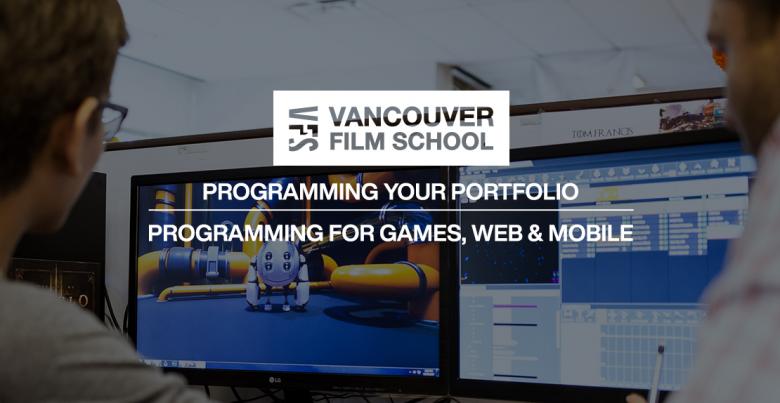Key Takeaways
- Create a balanced portfolio with both complete games and technical demos that demonstrate specific programming skills relevant to game development career opportunities.
- Showcase diverse technical skills by including projects that demonstrate proficiency in multiple programming languages and game design fundamentals that complement coding abilities.
- Develop expertise in popular game engines like Unity and Unreal Engine to demonstrate your ability to work with industry-standard tools used in professional development environments.
Creating a standout game programming portfolio requires technical expertise, diverse projects, and professional presentation skills. Vancouver Film School equips our students with these essential skills through our comprehensive Programming for Games, Web & Mobile program, where students create focused software development portfolios in a fast-paced production environment. We provide students with opportunities to work on real projects using industry-standard tools, preparing you for successful careers in the competitive game development industry. Whether you're a beginner or experienced programmer looking to break into the game industry, building an impressive portfolio is your ticket to landing that dream job.
TECHNICAL SKILLS THAT SHOWCASE YOUR GAME PROGRAMMING EXPERTISE
Demonstrating proficiency in a variety of programming languages forms the foundation of an impressive game development portfolio. Most employers seek programmers who exhibit versatility with C++, C#, and JavaScript, as these languages dominate the industry across different platforms and engines. Advanced programming techniques such as efficient algorithms, data structures, and design patterns should be prominently featured to showcase your depth of technical understanding. Game engine proficiency, particularly with Unity and Unreal Engine, serves as concrete evidence of your ability to apply programming knowledge within industry-standard frameworks.
Vancouver Film School Develops Industry-Ready Programming Fundamentals
Vancouver Film School teaches a comprehensive programming curriculum that covers both foundational coding skills and specialized game development techniques. VFS prepares students for technical roles by providing hands-on experience with C++, C#, Unity, and Unreal Engine throughout our intensive one-year program. Industry professionals mentor students on professional development techniques while working on practical projects that build technical portfolios matching current industry demands.
Essential Programming Languages for Game Development Portfolios
- C++ remains the backbone of AAA game development due to its performance optimization capabilities and widespread use in major engines.
- C# dominates the Unity ecosystem and provides an excellent balance between power and ease of use for many game types.
- JavaScript enables web-based game development and is essential for HTML5 games and some Unity projects.
- Python offers rapid prototyping abilities and is increasingly used for game tooling and artificial intelligence.
- Lua serves as a popular scripting language for game logic and is used in engines like Corona SDK and CryEngine.
- Shader languages (HLSL/GLSL) demonstrate graphics programming expertise that separates advanced candidates from beginners.
- Swift/Kotlin knowledge shows mobile development capabilities, which are highly valued in the current market.
CODE QUALITY STANDARDS THAT MAKE YOUR GAME PROGRAMMING PORTFOLIO SHINE
Clean code standards represent a crucial element that employers immediately notice when evaluating programming portfolios. Professional code organization following software architecture patterns such as MVC, component-based design, or data-oriented approaches demonstrates your understanding of maintainable development practices. Implementing robust code documentation, consistent naming conventions, and proper error handling showcases your commitment to quality—attributes that companies value highly since poor code organization can significantly impact game development timelines and costs.
Implementing Professional Documentation in Your Game Programming Projects
Professional game development documentation should include clear code comments, comprehensive README files, and design documents that explain your implementation decisions. Commenting techniques should strike a balance between providing context for complex algorithms without over-documenting obvious code, with special attention to highlighting performance considerations and design patterns. Most game development employers prefer to see a combination of in-code documentation and external technical documentation that addresses both implementation details and the bigger architectural picture of your projects.
 VFS Programming students have access to industry-standard software to help build their retail-ready games for their professional portfolios.
VFS Programming students have access to industry-standard software to help build their retail-ready games for their professional portfolios. STRONG GAME ENGINE PROFICIENCY ELEVATES YOUR PROGRAMMING CREDENTIALS
Mastering industry-standard game engines like Unreal Engine and Unity significantly enhances your employability in the competitive game development market. Employers specifically look for programmers who can demonstrate practical experience using engine-specific features such as Unreal's Blueprint system, Unity's component architecture, or custom shader development. Your portfolio should include projects that showcase understanding of engine workflows, performance optimization techniques, and the ability to extend engine functionality through custom systems—skills that directly translate to real development environments.
Vancouver Film School Prepares Programmers With Cutting-Edge Engine Training
Vancouver Film School trains students on modern game engines through comprehensive courses that integrate theoretical understanding with practical application. VFS programming students complete engine-specific projects including game prototypes, technical demonstrations, and collaborative development opportunities with other programs. The curriculum focuses primarily on Unity and Unreal Engine, the industry standards, while also teaching fundamental principles that allow students to adapt to any engine environment they might encounter in their professional careers.
PROBLEM-SOLVING CAPABILITIES DEMONSTRATED THROUGH GAME PORTFOLIO PROJECTS
Game development employers actively seek candidates who can showcase concrete examples of technical problem-solving in their portfolios. Your programming projects should highlight challenges you've overcome, such as optimizing performance bottlenecks, implementing complex game mechanics, or creating elegant solutions to computational challenges. Documentation of your problem-solving process – including the initial challenge, attempted approaches, and final solution – provides valuable insight into your analytical thinking capabilities and demonstrates your ability to overcome the unpredictable obstacles that frequently arise during game development.
What Makes a Game Programming Challenge Worth Including in Your Portfolio?
The most portfolio-worthy programming challenges demonstrate your ability to solve complex problems with elegant, efficient solutions that would impress hiring managers. Projects should strike a careful balance between technical complexity and clarity of implementation, avoiding both overly simplistic demonstrations and unnecessarily convoluted systems. When selecting challenges for your portfolio, prioritize those that showcase algorithmic thinking, performance optimization, or innovative approaches to combining programming skills with creative game design solutions.
YOUR GAME PROGRAMMING PORTFOLIO REQUIRES DIVERSE PROJECT DEMONSTRATIONS
A well-rounded game programming portfolio typically includes 3-5 substantial projects that collectively demonstrate your technical range and specialization balance. Employers value seeing a variety of project types – from complete games to technical demonstrations that highlight specific programming skills such as AI systems, procedural generation, or physics simulations. Including focused examples of non-game software projects can strengthen your portfolio by showcasing transferable skills like database integration, networking, or tool development that supplement your core game programming capabilities.
Collaborative Projects Showcase Essential Team Programming Skills
When highlighting team contributions, clearly delineate your specific programming responsibilities while acknowledging the collaborative nature of game development through proper attribution. Demonstrating proficiency with version control systems like Git, project management tools like Jira, and communication platforms like Slack or Discord signals to employers that you understand modern collaborative development workflows. Employers evaluate teamwork through evidence of successful integration with cross-disciplinary teams, ability to adapt to established codebases, and documentation that shows how you resolved technical challenges while working within team constraints.
Vancouver Film School offers comprehensive game programming education that prepares students for successful careers in the competitive gaming industry. Through our intensive one-year Game Design program, VFS provides students with hands-on experience developing real games using industry-standard tools and workflows. Students graduate with professional-quality portfolios that showcase their technical expertise, problem-solving capabilities, and collaborative skills – exactly what employers are looking for when hiring game programmers.
